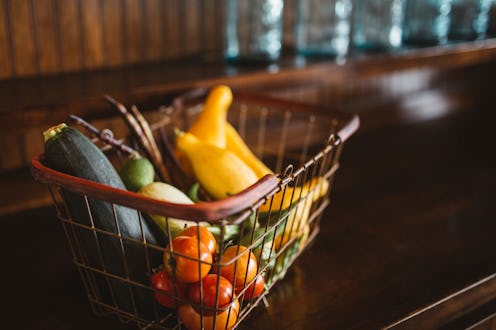Life
11 Ways To Make Your Groceries Last Longer

Buying your own food is not only healthy, but it can help you save money. However, it can be really frustrating when your food goes bad or when you find that you already need to return to the store to get more ingredients. Luckily, there are a number of ways to extend the life of your groceries, whether it means cooking your foods in bulk or taking proper care to store them in an ideal manner. Taking a few extra steps can ensure that your last grocery shop can last more than just a few days.
"Many people end up wasting their groceries simply for a lack of planning coupled with a busy lifestyle that leaves them feeling too drained to cook, especially at the end of the day," says Dina Garcia, RD, LDN over email. "The bottom line is to commit to simple meals then actually cook them so you don't waste the food."
Whether you're someone who buys too much food, or you find that your produce spoils way quicker than you could imagine, you want to make sure you're doing the right kind of shopping for the types of food you prepare at home. If you want to save money and avoid throwing away leftover food, try these 11 tips to help make your groceries last longer.
1. Plan Ahead
We've all had those days where we've aimlessly wandered around the grocery store and picked up what sounded good in the moment. "Make a simple outline/menu of what you plan to prepare for the week and build a shopping list around that," says Garcia. "With proper planning it's easy to nearly eliminate waste while only having to shop every 7-10 days. Before shopping, look at what items you already have on hand and build your menu/shopping list around those items."
2. Buy A Mix Of Fresh & Frozen
"Buy a mix of fresh and frozen fruits and vegetables," says Garcia. "Use fresh produce in whatever you are cooking early in the week and use the frozen produce later in the week." And don't worry about nutrients: frozen produce is just as healthy, if not more nutritious, than its fresh counterparts, as they are picked and stored at peak ripeness.
3. Add Some Paper Towel To Your Greens
No one likes a soggy spinach salad. "If you buy delicate greens like spring mix lettuce, arugula or spinach, open the container as soon as you get home and stuff a few paper towels down into the container surrounding the greens," says Garcia. "This will help absorb any moisture in the container that makes them rapidly wilt."
4. Freeze Anything You Don't Use
"As fruits reach their peak, if you don't think you will use them soon, freeze them for later use in smoothies, sauces or pies," says Garcia. "Freeze vegetables for later use in soups, stews, slow cooker recipes or just to steam as a side dish."
5. Store Certain Foods Separately
"Be careful which produce items you store together," says Garcia. "Ethylene-gas-producing fruits and vegetables (such as apples, grapes, kiwi, tomatoes) will speed up ripening of other fruits and vegetables (such as bananas, lettuce and berries).
6. Keep Your Groceries Visible
"At home, make the groceries visible," says nutritionist Brooke Alpert over email. "It's easy to forget about your salad greens when they're in a drawer somewhere. Save the drawers for bulk items or things that will last a while, and put the fresh food at eye level."
7. Prep Your Food
"Prep your food before you put it away — don't put those berries in the fridge until they are washed, dried, and put into a bowl," says Alpert. "You're more likely to eat food that's quick."
8. Make Sure Your Fridge Is A Good Temperature
"If [your fridge] is too warm, your food will spoil faster and can even be a food safety hazard," says Kitty Broihier, MS, RD, LD over email. "Get a refrigerator thermometer that sits on a shelf and check it periodically. Then make adjustments. The fridge should be at or below 40 degrees (freezer should be 0 degrees)."
9. Have Some Go-To "Everything Goes" Recipes
"Have a few 'everything I've got in the fridge' recipes in your head to make when you see that you have lots of little bits of things left," says Broihier. "In winter that can be soup or casseroles of various kinds. I make egg bakes (like a crustless quiche) year round to use up leftover veggies and proteins like steak or ham."
10. Avoid Buying In Bulk If You Don't Need To
"Don't buy in bulk just because it's a few cents cheaper if you're not going to be able to eat before it spoils," says Broihier. "Six heads of lettuce do nobody any good when they rot in the crisper drawer. If you only need a tiny bit of a type of vegetable you don't have on hand and don't think you'll finish, consider getting it at the salad bar. It's ok to buy just a few red pepper rings."
11. Use The Crisper Drawer The Right Way
"Take advantage of the crisper drawer in your fridge when storing items that need moisture such as grapes, celery, cucumbers, etc.," says Garcia. "But be sure to keep moisture-sensitive items out of the crisper drawer such as berries and delicate greens like spring mix lettuce."
Don't be afraid to get creative in the kitchen, which might mean throwing some unsuspecting foods together.
Images: Pixabay (12)